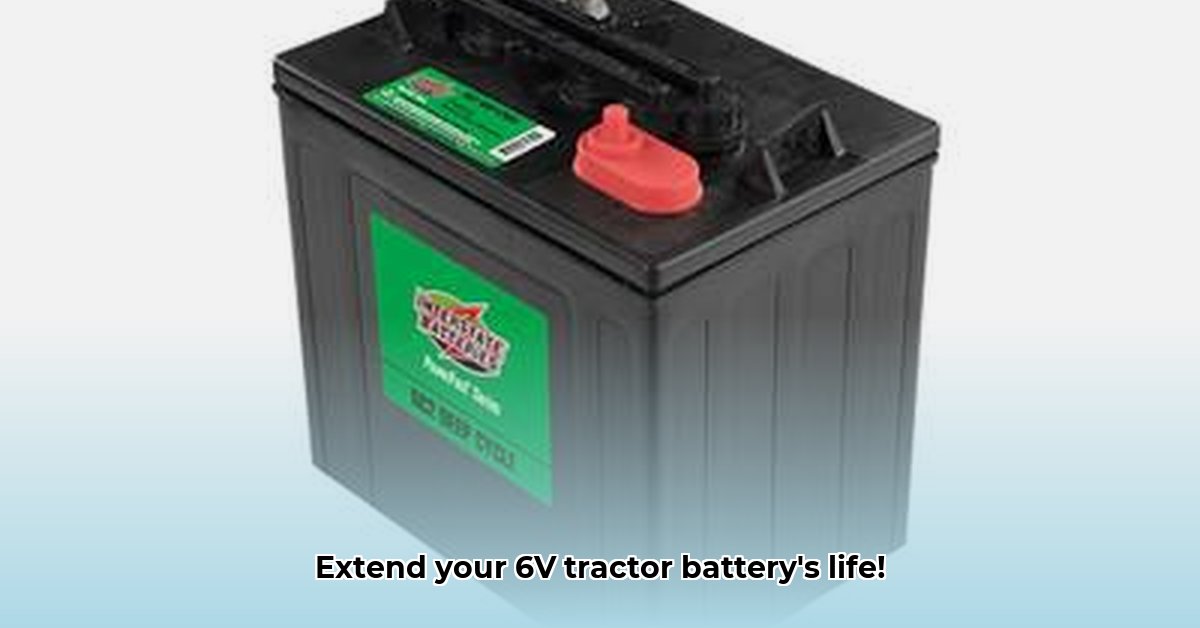
Farming demands reliable equipment, and your tractor's battery is no exception. This guide focuses on maximizing the lifespan of Interstate 6-volt tractor batteries, crucial for maintaining operational efficiency and embracing sustainable agricultural practices. We'll explore different battery types, compare technologies, and offer actionable maintenance tips to keep your farm running smoothly. For information on tractor costs, check out this helpful resource on tractor pricing.
Understanding Your 6-Volt Tractor Battery: The Workhorse
Older tractors often utilize 6-volt batteries, specifically designed for the demands of agricultural machinery. These are typically flooded lead-acid (FLA) batteries, known for their affordability and reliable performance. However, they require regular maintenance, including checking and replenishing the electrolyte fluid with distilled water. Why is this regular maintenance so important? Because neglecting it leads to premature battery failure and costly replacements.
Choosing the Right Power Source: A Comparison of Battery Technologies
While 6-volt FLA batteries are common, newer tractors often operate on 12-volt systems, providing higher cranking power and potentially longer lifespans. The transition, however, may involve significant modifications to your tractor's electrical system. A more modern alternative, lithium-ion (Li-ion) batteries, offer lightweight designs, high power output, and reduced maintenance. However, their significantly higher upfront cost presents a considerable barrier to entry for many farmers.
Here's a comparative analysis:
| Battery Type | Pros | Cons | Estimated Cost | Typical Lifespan (Years) |
|---|---|---|---|---|
| 6V Lead-Acid (FLA) | Affordable, reliable, readily available | Heavy, requires regular maintenance, shorter lifespan | Relatively Low | 3-5 |
| 12V Lead-Acid (FLA) | Higher cranking power, potentially longer lifespan | Requires maintenance, heavier than Li-ion | Moderate | 4-6 |
| 12V Lithium-ion | Lightweight, high power, low maintenance | High initial cost, temperature sensitivity | Significantly Higher | 7-10+ |
Isn't maximizing your battery's lifespan key to minimizing operational downtime?
Sustainable Farming: The Environmental Footprint of Battery Choices
Sustainable practices extend to equipment choices. Lead-acid batteries contain lead, a heavy metal requiring responsible recycling. Fortunately, many recycling programs exist, facilitating environmentally sound disposal. Li-ion batteries, while offering longer lifespans, have their own environmental considerations related to material sourcing and processing. Research continues to focus on improving the overall sustainability of Li-ion battery lifecycles, including more efficient and safer recycling methods.
Maximize Battery Life: Practical Maintenance and Recommendations
Prolonging your 6-volt battery's lifespan requires consistent care. Follow these steps:
Clean Terminals: Regularly clean battery terminals to prevent corrosion, a significant obstacle to optimal electrical conductivity. This simple step can significantly extend battery life.
Fluid Level Check (FLA Only): For FLA batteries, regularly check and maintain the electrolyte fluid level using distilled water. Never use tap water.
Maintain Full Charge: Ensure the battery remains fully charged using a slow charger to prevent damage and maximize lifespan. Understanding your battery's charging requirements is critical.
Environmental Protection: Store your battery in a cool, dry place to prevent premature degradation from temperature extremes.
Regular Testing: Utilize a battery tester periodically to identify potential issues early, before they lead to significant problems or complete failure. This proactive approach is key in preventing unexpected downtime.
Conclusion: A Sustainable Approach to Tractor Battery Management
Choosing and maintaining the right tractor battery is essential for efficient and sustainable farming. While 6-volt FLA batteries offer affordability and reliability, understanding their limitations and exploring alternatives like 12-volt FLA or Li-ion batteries, depending on your tractor's compatibility, will help you make an informed decision. Combining the right battery choice with consistent maintenance and responsible disposal practices ensures optimal performance and minimizes your environmental impact, maximizing your return on investment.